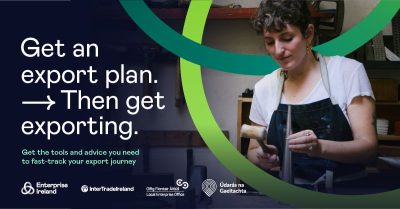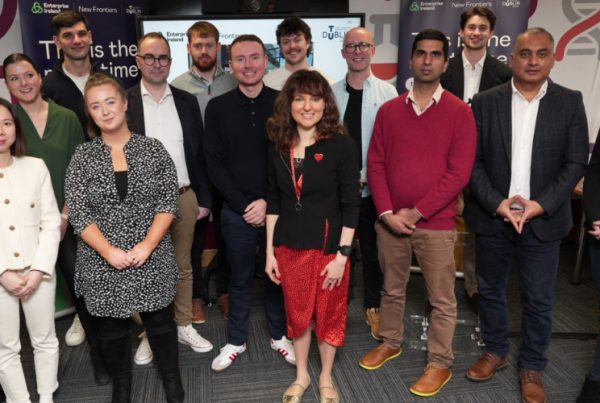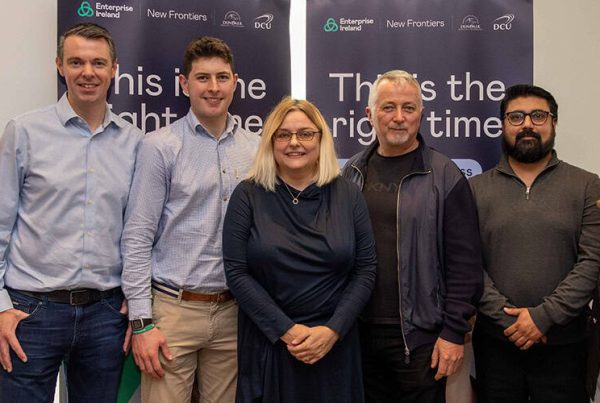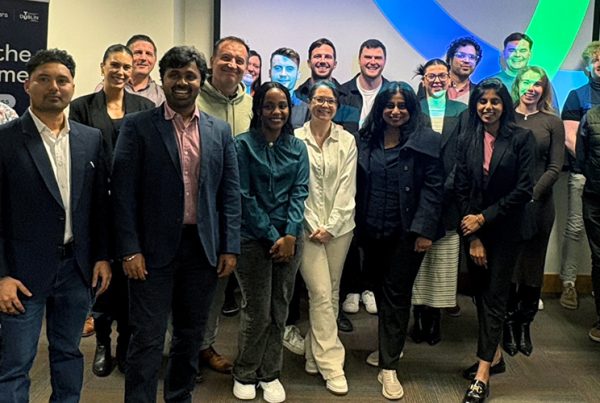
Ireland punches well above its weight when it comes to exporting, reflecting our long-standing emphasis on openness, innovation, and outward-looking ambition. But companies don’t just stumble into international markets on a whim. Successful exporters build the foundations for growth across their business first, then focus on enhancing their export capabilities and skills to tap into their export potential when the time is right.
If you run a business in Ireland that’s starting to gain traction (or is focused) domestically, export could still feel a long way off. There’s enough to deal with at home. But waiting until you need to export means you’ve already lost years of potential and possibly made decisions that will require time and effort to reverse. In this blog, we look at why exporting is an important consideration for Irish companies and how the Get Exporting programme could help you get export-ready.
We also spoke to someone who has been through the Get Exporting programme, New Frontiers alumna Dr Wendy Oke of TeachKloud. Wendy’s near-term goal is to establish India as a key growth market for TeachKloud’s comprehensive childcare management software, targeting Tier 1 and Tier 2 cities where there is strong demand for affordable, technology-driven childcare solutions. Longer term, she sees India as a gateway to wider Asian markets, building on the exporting capability developed through the Get Exporting programme.
At what point will you outgrow the domestic market?
Ireland represents just 0.06% of the global population, or 1 in every 1,500 people on Earth. Even a company that dominates their niche domestically faces structural constraints in Ireland that simply don’t exist in larger markets. In some cases, there may not even be a market domestically.
Selling to the EU, for example, allows you to reach a population that’s 81 times larger than Ireland’s. A bigger market also creates fundamentally different growth dynamics; it doesn’t just have ‘more customers’ but deeper verticals, more niches that can sustain a business, and buyer segments that don’t exist here.
Other markets may also expose you to different use cases and requirements. An international client’s bespoke request might reveal a product gap you didn’t encounter domestically, driving innovation that then strengthens your offering everywhere.
Why being export-ready matters
Building with export in mind doesn’t mean selling internationally tomorrow. It means making choices today that open you up to the potential in export markets.
Risk mitigation
Ireland’s economy is strong but concentrated. Regulatory changes, sector-specific shocks, or a dominant competitor entering your space can crater your domestic business overnight. Companies with revenue distributed across markets survive shocks that kill single-geography players.
Race to the top
Export markets can often deliver better margins than domestic sales. This is in part because of economies of scale but also because many mature economies have customer segments that recognise and pay for quality. Where value-based purchasing is normalised and price wars aren’t the default, you won’t need to compete purely on price.
Funding and valuations
When you export, you prove to potential investors that your model travels. It shows you’ve solved harder problems such as cross-border payments, multi-jurisdiction compliance, culturally adapted messaging, or distributed support. Businesses with operating leverage beyond one small economy have a significant advantage.
Product architecture
If your pricing, contracts, or product roadmap is designed solely for your current domestic clients, you risk creating technical debt. Reworking these later to meet the needs of international clients (or to follow a multinational into new markets) can be costly and delay growth. Designing with future markets in mind makes scaling smoother and more efficient.
Operational foundation
Key ops considerations like production capacity, supply chain and logistics, compliance frameworks, or customer support structures either work across jurisdictions or will require expensive parallel systems. Companies that build clean, portable operations from the start avoid the rebuild tax.
Fast-track your export journey with the Get Exporting programme
If your business has the ambition to export but does not know how and where to start, the Get Exporting programme is for you. It’s delivered in partnership with Enterprise Ireland (EI), Local Enterprise Offices (LEOs), InterTradeIreland, and Údarás na Gaeltachta, and will start in early 2026.
 The programme is for companies that have a deep understanding of their sector and the ambition to export. They have proven the business domestically or can demonstrate that their product/service meets a clear market need, backed by buyer feedback or confirmed by key opinion leaders.
The programme is for companies that have a deep understanding of their sector and the ambition to export. They have proven the business domestically or can demonstrate that their product/service meets a clear market need, backed by buyer feedback or confirmed by key opinion leaders.
Get Exporting helps companies to test their proposition in international markets, exploring whether what works domestically will stack up in other markets as well as which market to look for. There are various steps on the pathway, which can be grouped into three key phases:
- A free readiness assessment – in the form of a one-to-one online call with an advisor – will assess how ready you are to export. If you are eligible for the programme, you’ll move on to the second phase. If you aren’t yet ready, you will be given a clear action plan to work on with your relevant agency advisor.
- When on the programme, you will start working on your export fundamentals. The pathway includes pre-recorded webinars, tools, templates, and one-to-ones with an experienced export advisor.
Areas you will look at include market research, pricing and profitability, distribution channels, and value propositions. The result of this is the analysis and selection of an optimal target market based on the resources available to the business. You will work with a market specialist to get feedback on your proposition in the market(s) and establish if there is a real and accessible opportunity there worth progressing. - If a clear market opportunity is identified, you advance to the next phase. This involves in-person and online workshops that focus on key sales and marketing skills you’ll need such as lead generation, selling and pitching, negotiating, plus overall resource and finance planning.
Having developed an export action plan, an experienced market specialist will help you test it, providing introductions to further validate the interest in your product in the export market.
For Wendy, there were three key benefits from the Get Exporting programme. “My experience was extremely positive. It provided a broad strategic overview and detailed, actionable insights. The most beneficial elements for TeachKloud were the workshops (which helped us refine our approach to assessing international childcare software demand); the Export Plan fundamentals (which gave us a clear structure for mapping our India market entry strategy); and the 1:1 mentoring sessions (where we applied the frameworks directly to our business and test assumptions around pricing, regulation, and positioning in the Indian market). These mentoring sessions, with my amazing mentor Mouna, were invaluable and made a significant difference to our progress, thus far.”
Learn more about the programme, including eligibility criteria such as current export revenue thresholds, on the Enterprise Ireland site.
Prepare for international markets
If you aren’t ready to export, but believe in being prepared, there are things you can do now to ensure you’re in the best shape to start further down the line.
- Build market intelligence through continuous monitoring. Subscribe to sector-specific publications and newsletters from target markets. Attend events in your sector (in-person or virtually). Track how competitors position themselves internationally and what regulatory or industry shifts are happening elsewhere. This research costs almost nothing but builds a foundational understanding of how your space operates beyond Ireland.
- Test your assumptions early rather than waiting until you’re ready to sell. Talk to customers with international operations, advisors who know target markets, or prospects in those geographies. Validate whether your approach translates into other markets. Run small experiments such as targeted LinkedIn outreach, test ad campaigns, or exploratory sales conversations and keep collecting evidence about whether your proposition works as-is or needs adaptation while changes are still cheap to make.
- Design for portability by not baking in assumptions about how your home market works -currency defaults, regulatory references, labelling or formulations standards, distribution models, tax structures. Build systems that accept variability rather than hardwiring one country’s norms. Structure supplier agreements, product features, and operational processes to accommodate different jurisdictions without requiring ground-up rebuilds.
- Build compliance layering by remembering that compliance is a framework you build on, not a checkbox you tick. Document your data handling, privacy controls, and security practices in frameworks that map across jurisdictions (GDPR, SOC 2, ISO standards, US state privacy laws, etc.). Meeting one rigorous standard often gets you a good way towards meeting others.
Learning from those who have gone before
Preparation doesn’t require massive investment, but it does mean saying no to shortcuts that feel efficient now but lock you into the Irish market. The Irish companies that have built Ireland’s export track record didn’t export because they got lucky; they made choices early that kept exporting a viable option. When the time came, they moved ahead instead of spending two years preparing.
Now that Wendy has had time to start executing her export plans, what have been her biggest learnings? “The biggest insight has been the importance of localisation beyond translation. Exporting educational technology isn’t just about moving the same product into a new region – it requires understanding cultural differences, regulatory requirements, and trust-building with childcare providers and parents. In the case of India, we realised that factors such as device accessibility, price sensitivity, and compliance with local childcare regulations are as important as core product features. Another learning has been the need to develop partnerships with local stakeholders (such as publishers and training providers) to accelerate adoption. I have also learned that the roadmap will take much longer than previously anticipated and so, patience will be key to sustained growth.”
About the author
 Scarlet Bierman
Scarlet Bierman
Scarlet Bierman is a content consultant, commissioned by Enterprise Ireland to fulfil the role of Editor of the New Frontiers website. She is an expert in designing and executing ethical marketing strategies and passionate about helping businesses to develop a quality online presence.
Recent articles

The New Frontiers Programme Connects 158 Founders With Success Stories

Raise Your Startup’s Visibility & Credibility By Entering These Competitions

Founder Perspectives: Lessons From Building Businesses In Sustainability

Tech Startups In The Age Of AI: Alumnus Paul Savage On Speed, Quality & Risk

Fourteen Startup Founders Graduate From Phase 2 Of New Frontiers In Tallaght

Eleven Founders Graduate From New Frontiers In The Border Mid-East Region

Laying The Right Groundwork Helps Startups Prepare For Export Success

 Scarlet Bierman
Scarlet Bierman
